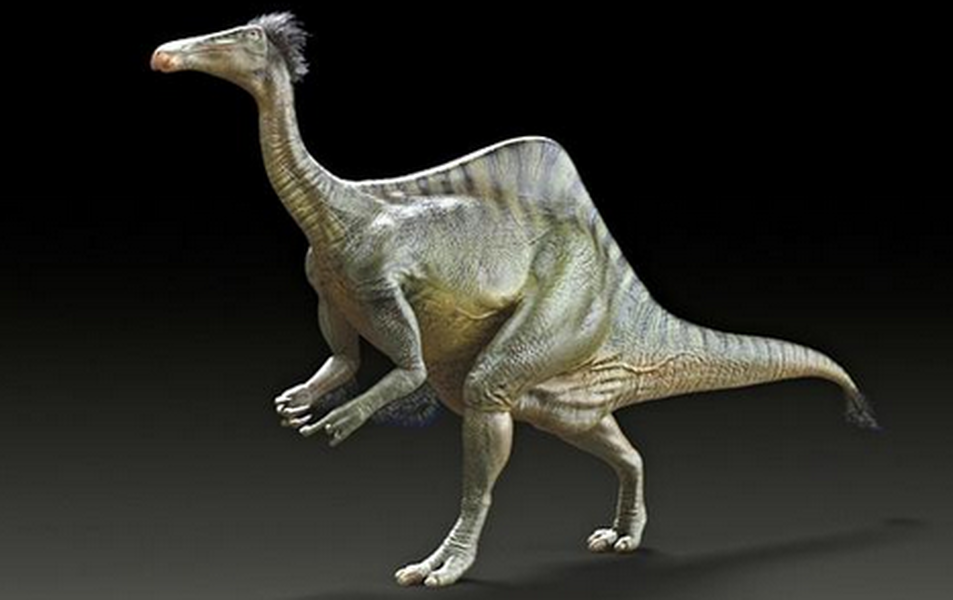Scientists figure out why this dinosaur was so ugly


A free daily email with the biggest news stories of the day – and the best features from TheWeek.com
You are now subscribed
Your newsletter sign-up was successful
Scientists have long wondered about Deinocheirus mirificus, an oddball, 70 million-year-old dinosaur. The scientists report that the dino had a "beer belly," a duckbill, a camel-like hump, and ostrich-like neck (in fact, it's an ancestor of the modern ostrich). A study published today in the journal Nature finally explains the dinosaur's mutant appearance.
Researchers at the Korea Institute of Geoscience and Mineral Resources and the Mongolian Academy of Sciences were able to create an image of the dinosaur after studying bones that had been missing for years, Bloomberg reports. The missing bones had been sold on the black market to private collectors. The recovered skull bones, along with Deinocheirus bones recently discovered in the Gobi Desert, have finally allowed the scientists to create a nearly-complete skeleton from the dinosaur. Fragments of the dinosaur's arm bones were first discovered in 1965, and the species was named for its "horrible hands."
Thomas Holtz, a paleontologist at the University of Maryland, told Bloomberg that the Chimera-like dinosaur was "peculiar." Its oddities had their uses, though: The Deinocheirus mirificus used its tongue to "suction fish and plants" from lakes and ponds, since the dinosaur lacked teeth. Its beak, meanwhile, allowed it to eat plants. As for its stature — the dinosaur was 16 feet tall and 36 feet long, almost the size of a T-rex — the scientists suspect the Deinocheirus mirificus grew to a large size to avoid being eaten.
The Week
Escape your echo chamber. Get the facts behind the news, plus analysis from multiple perspectives.

Sign up for The Week's Free Newsletters
From our morning news briefing to a weekly Good News Newsletter, get the best of The Week delivered directly to your inbox.
From our morning news briefing to a weekly Good News Newsletter, get the best of The Week delivered directly to your inbox.
Holtz added that the researchers will use the findings on the dinosaur "to better understand ancient ecology," Bloomberg notes.
A free daily email with the biggest news stories of the day – and the best features from TheWeek.com
Meghan DeMaria is a staff writer at TheWeek.com. She has previously worked for USA Today and Marie Claire.
-
 Political cartoons for February 16
Political cartoons for February 16Cartoons Monday’s political cartoons include President's Day, a valentine from the Epstein files, and more
-
 Regent Hong Kong: a tranquil haven with a prime waterfront spot
Regent Hong Kong: a tranquil haven with a prime waterfront spotThe Week Recommends The trendy hotel recently underwent an extensive two-year revamp
-
 The problem with diagnosing profound autism
The problem with diagnosing profound autismThe Explainer Experts are reconsidering the idea of autism as a spectrum, which could impact diagnoses and policy making for the condition
-
 Blue Origin launches Mars probes in NASA debut
Blue Origin launches Mars probes in NASA debutSpeed Read The New Glenn rocket is carrying small twin spacecraft toward Mars as part of NASA’s Escapade mission
-
 Dinosaurs were thriving before asteroid, study finds
Dinosaurs were thriving before asteroid, study findsSpeed Read The dinosaurs would not have gone extinct if not for the asteroid
-
 SpaceX breaks Starship losing streak in 10th test
SpaceX breaks Starship losing streak in 10th testspeed read The Starship rocket's test flight was largely successful, deploying eight dummy satellites during its hour in space
-
 Rabbits with 'horns' sighted across Colorado
Rabbits with 'horns' sighted across Coloradospeed read These creatures are infected with the 'mostly harmless' Shope papilloma virus
-
 Lithium shows promise in Alzheimer's study
Lithium shows promise in Alzheimer's studySpeed Read Potential new treatments could use small amounts of the common metal
-
 Scientists discover cause of massive sea star die-off
Scientists discover cause of massive sea star die-offSpeed Read A bacteria related to cholera has been found responsible for the deaths of more than 5 billion sea stars
-
 'Thriving' ecosystem found 30,000 feet undersea
'Thriving' ecosystem found 30,000 feet underseaSpeed Read Researchers discovered communities of creatures living in frigid, pitch-black waters under high pressure
-
 New York plans first nuclear plant in 36 years
New York plans first nuclear plant in 36 yearsSpeed Read The plant, to be constructed somewhere in upstate New York, will produce enough energy to power a million homes
